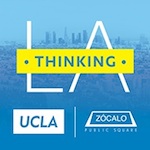
If you were surfing the Internet in 2004, you wouldn’t have known that the sophisticated music hosting and stock graphics websites you stumbled upon were being run by a 12-year-old hobbyist.
I was that 12-year-old. After school, I’d prioritize building websites over doing my reading comprehension questions that were due the next day.
After being inspired by hobbyist-created music websites, I began teaching myself the coding languages HTML and CSS. Even then, I had no idea what “computer science” was. Because my middle school and high school in La Puente, a lower-income city in Southern California, never offered a computer science course, I was left to my own assumptions. I didn’t realize I could make a well-paying career out of technology.
But months after graduating from college in 2012, I learned about computer science through codecademy.com, an interactive website that gives free coding lessons. After dabbling in my first few Javascript and PHP lessons, I was hooked. The thought of creating something with code—the thought of innovating—excited me. Why was I was never aware of the benefits of knowing what programming was—until then?
Through its Educate to Innovate initiative, the Obama administration has argued that investments in science, technology, engineering, and math are essential to keeping the country internationally competitive. But the initiative has focused on getting more technology into schools and has not included teaching kids what could help them compete internationally: coding skills.
The majority of students who are being taught to code live in wealthier areas. “Computer science has become privileged knowledge,” said Chris Stephenson, the executive director of the Computer Science Teachers Association, a professional network. School districts in well-off cities like South Pasadena and Arcadia offer basic computer programming courses as well as advanced placement computer science. Nearby, less prosperous Alhambra only offers one programming class at one of the district’s high schools.
Brian Au, a senior at Alhambra High School, recognizes that many of his classmates understand the importance of knowing how to code, but that doesn’t seem to be a priority of the adults in the school district. “I think the district is promoting the use of computers,” Au said. “But I don’t think computer science itself is being promoted.”
The heart of the problem: computer literacy is still too often confused with computer science. Computer literacy refers to familiarity with applications like word processors, e-mail, and use of the Internet; computer science refers to the study of algorithmic processes, hardware and software designs, and ways to impact society with technological innovation (according to the President’s Council of Advisors on Science and Technology). A general computer science curriculum largely consists of critical thinking, problem solving, and logic—the skills that American students will need in order to compete for the best jobs, whether or not they go into tech. People with coding skills are now being hired into journalism, entertainment, and healthcare, too.
Still, there is resistance. Paul Fung, the district librarian of Bellflower Unified School District in L.A. County, believes that computer science should be an afterschool elective instead. “I don’t believe in teaching technical skills because those skills change,” he said. “But a general education that includes philosophy and literature would teach students how to become a person, and then the technical skills can come later.”
The trouble with that view is that computer programming is now part of general literacy—the language you must master to understand the different technologies that run the world.
Failing to teach computer science to students in places like my hometown of La Puente may keep them behind wealthier students who’ve had the opportunity to learn it much earlier on.
According to the Bureau of Labor Statistics, the median salary of a software developer with only a bachelor’s degree was $93,350 per year in 2012. Additionally, the bureau projects that the job market for software developers will grow by 22 percent in 10 years, which is much faster than the average.
How, in this new world, can our government and our schools deny any student computer science?





Send A Letter To the Editors